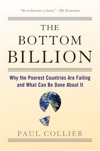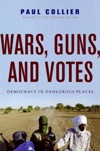kenyaView







Books 8: Kenya and Africa - Politics and Economics
After the presidency of Daniel arap Moi was defeated in 2002, the new president of Kenya, Mwai Kibaki promised an end to corruption. His anti-corruption minister was John Githongo. However, when Githongo really tried to remove corruption, rather than simply transfer it from Moi's Kalenjin people to Kibaki's Kikuyu, he was threatened, and had to leave Kenya. The book 'It's Our Turn to Eat' by Michela Wrong tells his story. It is the current stand-out book about Africa. You should read it.

Paul Collier is the Director of the Centre for the Study of African Economies at Oxford University. He has produced two books which try to explain some of Africa's economic and political underperformance compared to the rest of the world. 'The Bottom Billion' talks of four traps: Conflict (civil war and coups d'état), Natural Resources (having too many, so that the government doesn't need to collect taxes from citizens, and therefore loses interest in the fate of the citizens), being Landlocked with Bad Neighbours, and being Badly Governed in a Small Country.
'Wars, Guns and Votes' is basically the same book with a little extra on weapons sales. It includes suggestions on supporting good government in Africa by offering guarantees against coups d'état to governments which accept genuine democratic processes and spend on development not weapons. However, it glides over some obvious problems. For example, the US, Britain and France are suggested as countries which might offer these guarantees, but these are the world's three biggest state-supported arms sellers.
When considering nation building, Collier says, "Rapidly put together in a surge of immigration, America was an instant society, but is now an old nation". He says that African nationhood cannot be built in this way. He ignores the fact that the American immigrants effected genocide on the previous inhabitants, and destroyed the culture of the forced immigrants (African slaves). The free immigrants were selected to be ethnically and religiously compatible. The currently unpopular notion that elimination of others, or their absorbtion by a dominant group is the only way to build large nations is not examined.
These books are rather glib in parts. Despite claiming to do the opposite, they hope that what we want to be true is actually true. Of the two, the Bottom Billion is the better.

